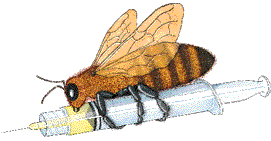
MDs
sceptical, but patients say bee venom relieves MS symptoms
CMAJ 1998;158:708
© 1998 Canadian Medical Association

Every Saturday, 40 people make their way to Ron
Lofthouse's beehives in Buckhorn, Ont. They're looking to get stung, not
buy honey, but they're not participating in some bizarre S and M ritual.
Instead, they maintain, honey bee venom (HBV) not only offers relief
from the pain but also returns the mobility that has been lost over the
years to a relentless foe, multiple sclerosis (MS).
Whitby, Ont., family physician Scott Henderson has
been monitoring one of his patients, who has been diagnosed with MS and
is a member of the group of 40. He has been treating the patient since
1992 and prescribing medication to treat the disease, but until recently
he had been frustrated and was simply charting the progress of the
disease as it robbed his patient of more and more functions.

Henderson's patient decided on her own to try HBV; she
was stung for the first time last April and since then Henderson has
monitored results of the weekly stings she receives. He has noticed some
improvement in both her physical condition and attitude, and says the
amount of medication she is taking has been reduced. The woman says she
has regained her energy. Last year, for the first time in years, she
went raspberry picking.
However, despite such anecdotal evidence an expert in
the MS field is sceptical and prescribes caution. Neurologist Paul
O'Connor, director the MS clinic at St. Michael's Hospital in Toronto,
will neither prescribe nor recommend bee venom to his patients. He said
its benefits are unproven and there is a risk of allergic reaction to
the stings, which increases with the number of times a person is stung.
Henderson agrees that caution is warranted, and says
he cannot say for sure whether the improvement in his patient is due to
natural remission, which is a characteristic of this form of the
disease, or the HBV. Firmer evidence is expected later this year, when a
study dealing with the impact of HBV on MS is expected to be published.
— © Peter Wilton